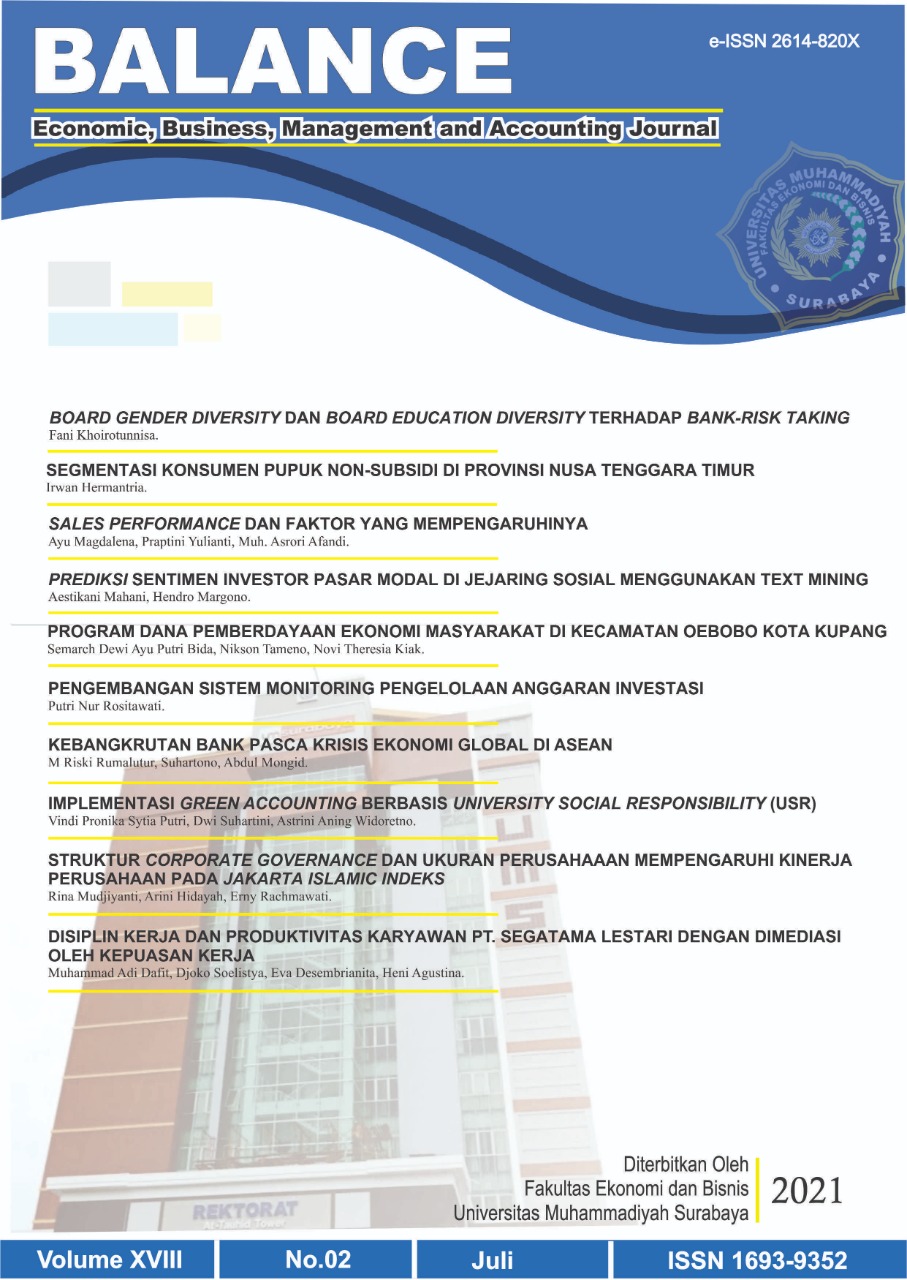Board Gender Diversity Dan Board Education Diversity terhadap Bank-Risk Taking
DOI:
https://doi.org/10.30651/blc.v18i2.5375Abstract
The benefit of gender and education diversity on the board of commissioners is a subject of the current debate. This research investigates board gender diversity and board education diversity on bank risk-taking in Indonesian listed banks. Using a sample of 40 Indonesian banks over a period from 2012 to 2018, we find that board gender diversity has a significant negative effect on bank risk-taking. In contrast, the nationality diversity between bank's board members does not directly impact bank risk-taking. This study concludes that the more significant the proportion of women on the bank's board, the less risk the bank has.
Â
Keywords                   : Board Gender Diversity; Board Education Diversity; Bank Risk-Taking
Correspondence to       : fani.khoiro.mnj@upnjatim.ac.id
Â
Â
Manfaat keberagaman jenis kelamin dan latar belakang pendidikan dewan komisaris menjadi topik perdebatan akhir-akhir ini. Penelitian ini mengkaji dampak dari keberagaman jenis kelamin dan latar belakang pendidikan dewan komisaris terhadap pengambilan risiko bank di bank-bank yang terdaftar di Indonesia. Dengan menggunakan sampel dari 40 bank di Indonesia selama periode dari 2012 hingga 2018, peneliti menemukan bahwa keragaman jenis kelamin dewan memiliki pengaruh negatif yang signifikan terhadap pengambilan risiko bank. Sebaliknya, perbedaan latar belakang pendidikan tidak berdampak langsung pada pengambilan risiko bank. Kesimpulan dari penelitian ini adalah semakin besar proporsi wanita dalam dewan komisaris bank maka semakin kecil tingkat pengambilan risiko bank.
Â
Kata Kunci                 : Board Gender Diversity; Board Education Diversity; Bank Risk-Taking
References
Berger, A. N., Kick, T., & Schaeck, K. (2013). Executive board composition and bank risk taking. Journal of Corporate Finance.https://doi.org/10.1016/j.jcorpfin.2013.11.006
Bertrand, M., & Schoar, A. (2003). Managing with style: The effect of managers on firm policies. The Quarterly Journal of Economics, 118(4), 1169–1206.
Carter, D. A., Simkins, B. J., & Simpson, W. G. (2003). Corporate governance, board diversity, and firm value. Financial Review, 38(1), 33–53. https://doi.org/10.1111/1540-6288.00034
Frye, M. B., & Pham, D. T. (2017). CEO Gender and Corporate Board Structures CEO Gender and Corporate Board Structures Abstract.
Graham, J. R., & Harvey, C. R. (2001). The theory and practice of corporate finance: Evidence from the field. Journal of Financial Economics, 60(2–3), 187–243. https://doi.org/10.1016/S0304-405X(01)00044-7
Gulamhussen, M. A., & Santa, S. F. (2016). Female directors in bank boardrooms and their in fl uence on performance and risk-taking ☆. Global Finance Journal, 28(January 2010), 10–23. https://doi.org/10.1016/j.gfj.2015.11.002
Houston, J. F., Lin, C., Lin, P., & Ma, Y. (2010). Creditor rights, information sharing, and bank risk taking. Journal of Financial Economics, 96(3), 485–512. https://doi.org/10.1016/j.jfineco.2010.02.008
Lepetit, L., & Strobel, F. (2013). Bank insolvency risk and time-varying Z-score measures. Journal of International Financial Markets, Institutions and Money, 25(1), 73–87. https://doi.org/10.1016/j.intfin.2013.01.004
Mateos de Cabo, R., Gimeno, R., & Nieto, M. J. (2012). Gender Diversity on European Banks’ Boards of Directors. Journal of Business Ethics, 109(2), 145–162. https://doi.org/10.1007/s10551-011-1112-6
Poletti-hughes, J., & Briano-turrent, G. C. (2019). International Review of Financial Analysis Gender diversity on the board of directors and corporate risk : A behavioural agency theory perspective. International Review of Financial Analysis, 62(August 2018), 80–90. https://doi.org/10.1016/j.irfa.2019.02.004
Sutedi, Adrian. (2011). Good Corporate Governance. Jakarta: Sinar Grafika.
Yang, P., Riepe, J., Moser, K., Pull, K., & Terjesen, S. (2019). Women directors, firm performance, and firm risk: A causal perspective. Leadership Quarterly, 30(5), 101297. https://doi.org/10.1016/j.leaqua.2019.05.004















